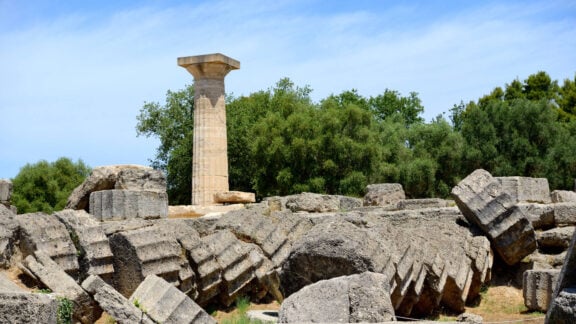The 25th April 1916 was the first date that Anzac servicemen and Anzac medical teams had left Gallipoli to continue their war efforts around Greece and Europe.
To understand the strength of emotions felt that first year of Anzac Remembrance you would need to know what the diggers had experienced. They would forevermore remember Gallipoli and the loss of thousands of lives.
In the eyes of the Anzacs that served at the storming of the peninsula, there had been discontent with the decisions of the ‘Brass’. Blunders, where made by sending the troops at locations where the land form was unfamiliar to the soldiers and the leading commanders. They had not heeded the warnings of the local Greeks that had told them of the steep cliffs that were characteristic of the rough terrain common in Greece and along the coast of Asia Minor. Winston Churchill resigned as Naval Commander and the storming of the Dardanelles and Gallipoli for years had haunted him.
READ MORE: There were Greek Anzacs who served at Gallipoli and fought for their new country
For the common soldier, a new code was born – ‘mateship’, a strong feeling of ‘watching out for your own’. This Anzac code gave our soldiers a reputation that stormed the world. They were renowned for their courage, bravery and instinctive strategic stills. Their ‘bush’ ingenuity in creating ‘trench-tool gun gadgets’. As ‘snipers’ they could not be compared. Those that came from the countryside had skills that were valuable, those that didn’t learnt fast because they worked as a team. No room for ‘tall poppies’.This reputation my father told me carried on in WW2 as he remembered.
It was the first year of Anzac Day when Anzac soldiers remembered their fallen. It began as a silent ritual commemorating the Anzac nurses and medical staff. They remembered them on their way to Gallipoli. They came from different backgrounds and from all walks of life. They were Australian but of different origins including Indigenous Australians and New Zealanders. They were united as one for the first time. Australia and New Zealand as new nations had responded to the call of the ‘motherland’ and pitched in the war effort.
READ MORE: The contribution of the Cretan legion in Gallipoli
The young soldiers and medical teams had no idea where they were going and what warfare meant. They learnt fast. They saw war was ugly and still, they served and remembered. They focused on selflessly helping each other and saving as many lives as they could. When they came home after the war. They were silent. Thousands died. Many returned ‘broken’ and others came back with experience in strategy. The Anzac legend was born.
LEST WE FORGET.
Debbie Papadakis was born in Sydney and now lives in Athens where she works as an ESL teacher, freelance journalist and also writes stories and poetry. She supports a number of Anzac Day projects with the Daughters of Penelope.








